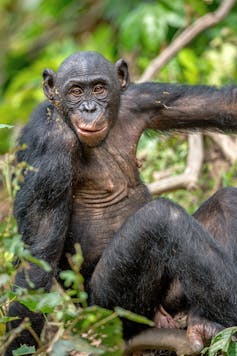Homosexuality may have evolved for social, not sexual reasons
Category: Health, Science & Technology
Via: dignitatem-societatis • 5 years ago • 14 commentsBy: Andrew Barron - Professor, Macquarie University



How did homosexuality in humans evolve?
Typically, this question is posed as a paradox .
The argument is this: gay sex alone can’t produce children, and for traits to evolve, they have to be passed onto children, who get some form of competitive advantage from them.
From this perspective, some argue homosexuality should not have evolved.
In a paper published yesterday by myself and Duke University professor Brian Hare, we propose human sexuality (including homosexuality) evolved as an outcome of the evolution of increased sociability in humans.
We argue many of the evolutionary forces that shaped human sexuality were social, rather than based on reproductive ability.
This is our “sociosexual hypothesis” for the evolution of gay sex and attraction.
Sex for bonding
For humans, and many other animals, sex is not just about reproduction.
Bonobos and chimpanzees share about 99.6% of their DNA with humans. shutterstock
In our closest primate relative , the bonobo, straight and gay sex have vital roles in play, social transactions, barter of food, same-sex social bonding and bonding between mating pairs.
We shouldn’t limit our thinking about the evolution of sex to its reproductive functions. We must also consider its social functions.
Based on the social behaviour of primates (and other social mammals), we argue our species’ recent cognitive and behavioural evolution was driven by natural selection favouring traits that allowed better social integration. This is called prosociality.
Early humans that could quickly and easily access the benefits of group living had a strong selective advantage. We believe this led to the evolution of a whole range of traits including reduced aggression, increased communication, understanding, social play and affiliation.
Species such as the bonobo, that evolved for high prosociality, evolved to use sexual behaviour in many social contexts. This results in an increase of sex in general, greater diversity in the contexts of sex, and an increase in gay sex.
We believe something similar happened in recent human evolution. Gay sex and attraction may have evolved because individuals with a degree of same-sex attraction benefited from greater social mobility, integration and stronger same-sex social bonds.
This may sound counterintuitive, given gay people are socially marginalised, ostracised and even criminalised in many societies.
However, our argument addresses the early evolution of human sexuality, not how relatively recent phenomena like religion and religion-based legal structures have responded to sexual minorities.
Supporting facts
Many studies since the pioneering research of Alfred Kinsey and colleagues have emphasised that sexual minorities occur across all cultures , and the levels of gay and bisexual people in populations have been quite stable over time.
Our hypothesis predicts that bisexuality and people who identify as “mostly straight” should be more common than people who identify as exclusively gay, and this is the case .
Recent genetic analyses confirm hundreds of genes influence sexuality in complex ways.
We quite randomly inherit half our genes from each parent. Each person’s genetic makeup is unique, so it would be highly unlikely to find two people with exactly the same set of genes influencing their sexuality.
Thus, variation is expected, and individuals fall along a spectrum ranging from a majority who are straight, to a minority who identify as gay.
Our hypothesis for the evolution of homosexuality would predict this kind of variation in human sexuality, and can help explain why it is generally stable across cultures.
We believe sexuality is a highly complex trait, interwoven with sociality. Attraction, sexual behaviour, social bonds and desire all contribute to its complexity.
Asking the right questions
Height is another feature influenced by hundreds of genes, many of which interact with our external environments in complex ways.
We see a continuous variation in human height – some very tall and very short people exist.
We might draw on nutritional ecology to explore the evolution of human height, but would not feel the need to introduce special evolutionary arguments to explain the existence of tall or short people.
No special explanation is necessary. They are simply exhibiting natural, genetically influenced variations in height.
Similarly, we think asking how gay sex and attraction evolved is the wrong question.
A more useful question to ask is: how did human sexuality evolve in all its forms?
In doing do, we acknowledge homosexuality does not present a paradox needing a special explanation. It is simply a result of our species’ recent sociosexual evolution.




It looks like variation in sexuality is as natural as any other genetic variation in human populations.
What's the justification for discrimination and/or persecution again?
With Mayor Pete doing so well in the delegate race thus far, this article feels apropos.
Here is a point I found particularly interesting in the seed:
Having a diversity of sexual impulses is what one would expect from an undirected process of variation. The fact that homosexuality can offer value to the survival of the group is a very good explanation for why species that produce 7-10% homosexuals would continue to exist.
Further, if there was a God directing things and said God deemed homosexuality immoral (abomination) then logically this God would not continue to produce homosexual individuals.
Don't you remember TiG: homosexuality is the result of sin. God doesn't make homosexuals. Man chooses to be homosexual. >sarc <
It does get old seeing so many people treat religious claims as truth while denying extremely well-founded science.
Tell me about it. How some people can be so willfully ignorant and/or delusional is beyond me.
Lol. Yeah, the so-called 'fall of man'.
I wonder how the Bible missed that whole 'fall of bonobo' thing.
There's a reason bonobos aren't often available for public viewing in zoos. They are extremely sexual, both straight and 'gay'. They're doing it all the time.
People often refer to chimps as our closest relatives, but we have as much DNA in common with bonobos as we do with chimps, and in some behavioral ways (especially sexually), we are actually closer to bonobos.
Freakin' sinners!
Gordy! Why? The standard 'issue' stuff shuts down discussion before it can get going good. Don't you realize this?
I prefer discussions based on facts and evidence, not BS and misinformation and/or ignorance. No one needs that kind of "discussion."
I prefer gobs of ice cream, but it is not proper for my 'sugar.' Still, I do not meet people at the ice cream counter with 'jokes' or 'wink-winks.' Can't we just talk about the subject matter first, and get to the tear down of each other at some later point? After all, you really do not properly know where we 'butches' and 'queenies' come from factually—or do you?
Nothing. At least, nothing rational or logical.
Sex had not evolved. It is now what it has always been.
What do you mean?
Of course sex evolved. If it hadn't, then most plants and animals wouldn't exist (including humans), and everything that did exist would be reproducing asexually, like bacteria.
From the article: "Recent genetic analyses confirm hundreds of genes influence sexuality in complex ways."
That means that because genes evolve, behaviors associated with gene expression evolve, too (like sexuality).
Quick thought: It may be homosexuality is the other side of "opposite attraction." For example, this world is supremely full of contrasts.
Not everything needs to have a reason - or at least not a reason that has some value in our minds. People start finding reasons for stuff and it influences how they treat other people. We should be valuing and loving our fellow human beings without needed to justify it (or the lack of it) with reasons about why people are different.